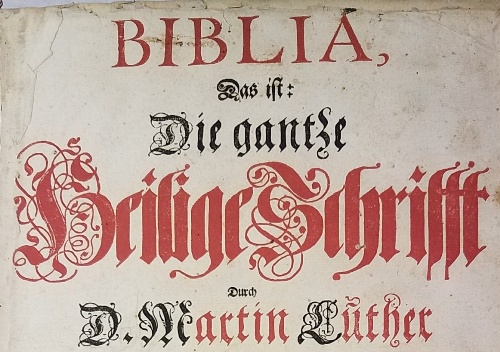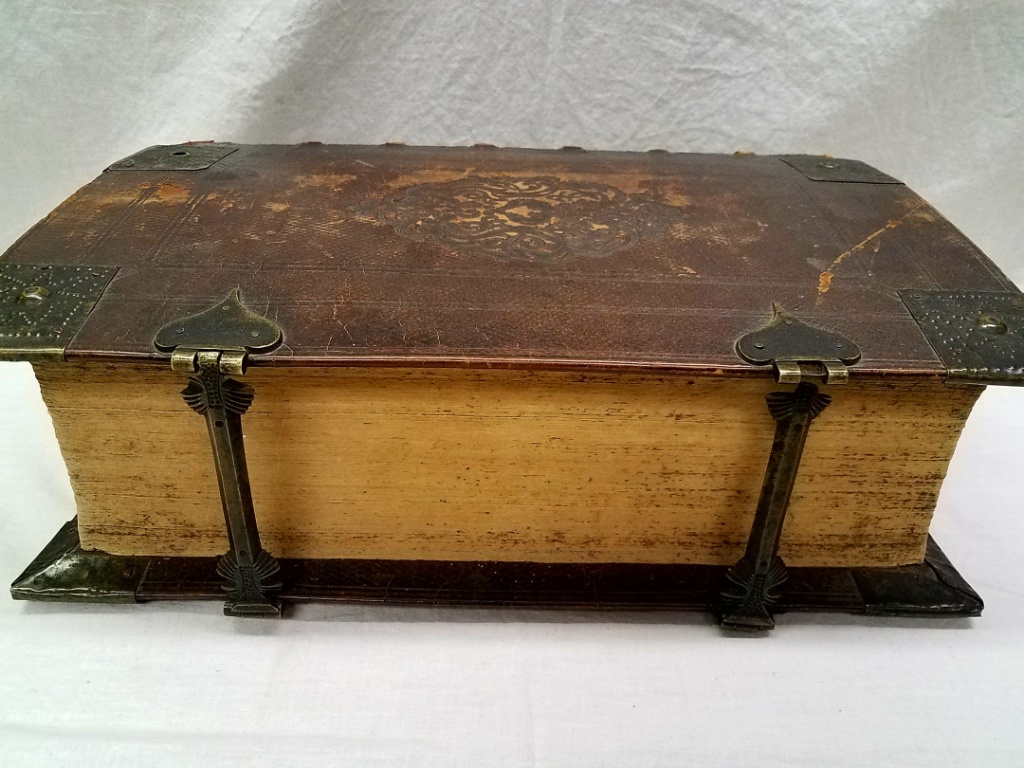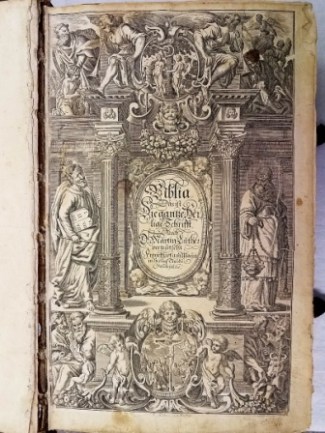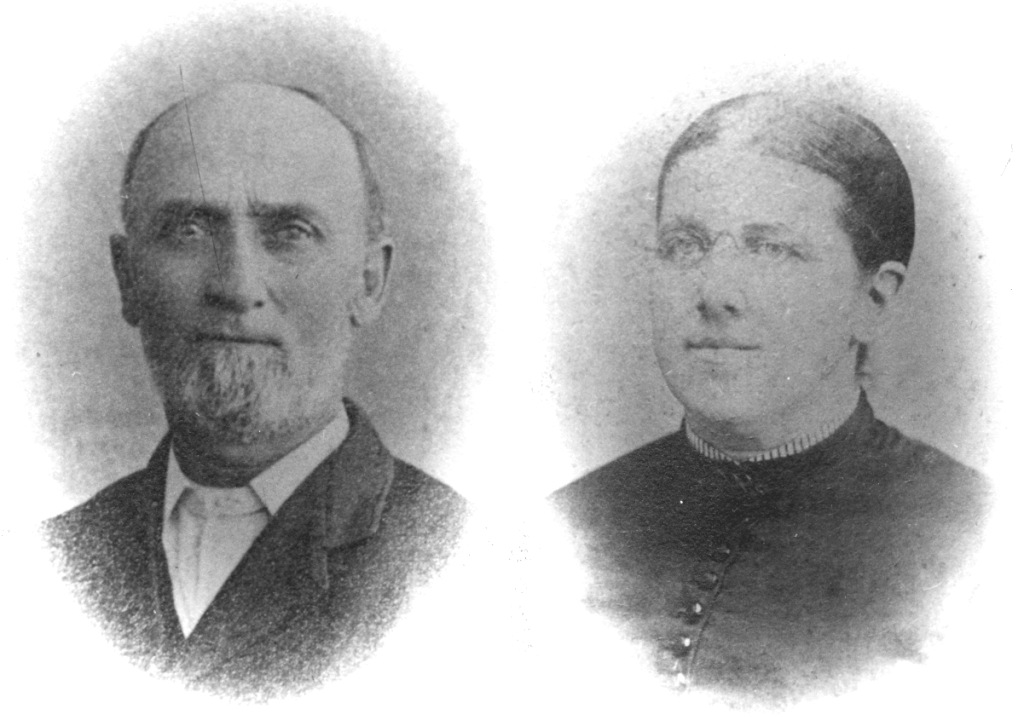New acquisition: Geyer-Ziegler family Bible
Written by Joel Alderfer on April 19, 2018

Recently, a German Bible published in 1693 in Frankfurt was donated to the Mennonite Heritage Center by Henry A. Ziegler of near Bally, PA. An inscription on the second page indicates the Bible was purchased by Johann Wilhelm Geyer in 1752 in Frankfurt, Germany, and was brought by him to Pennsylvania that year. He wrote: “1752 den 24 May hab ich Wilhelm Geyer diese Bibel gekaufft im Franckfort am Mayn” [1752, the 24th of May, I, Wilhelm Geyer have purchased this Bible in Frankfurt am Main]. The Bible has a fine binding with beautifully-tooled brass clasps, and is in relatively good condition. It contains a full page of inscriptions plus a number of loose sheets and fragments of inscriptions from the first generation of the Geyer family in Pennsylvania. Even more exciting, the Bible contained several 18th century fraktur manuscripts, which I’ll describe later.



The 1693 Bible’s binding, title page, and engraved frontispiece.
According to evidence and family tradition, John William Geyer (1723-1808) first arrived in Pennsylvania in September 1749, but for some reason went back to Germany apparently in the spring of 1752, purchased the Bible in Frankfurt, and soon returned to Pennsylvania. He married Anna Maria Kechlein (1725-1806), perhaps while back in Europe. They settled in Upper Hanover Township, Philadelphia (now Montgomery) County, became members of the New Goshenhoppen Reformed congregation and are buried there. John William died in 1808, two years after his wife, and left five surviving children: John, Michael, Henry, Conrad, and Catharine Geyer.


Gravestones of Anna Maria and John William Geyer. Photos by Joel Alderfer.
Fraktur from the Bible also donated
Found in the Geyer Bible were three fraktur-decorated manuscripts which are dated, and are either signed or have individuals named on them. One is a birth or baptismal certificate for Anna Margareta Geyer, daughter of John William and Anna Maria, dated “New Goshen Hoppen, Anno 1762. August 4th”, but apparently actually made at the time of her confirmation in 1776. According to the New Goshenhoppen Reformed Church records, August 4th was her birthdate, not baptismal date.

A second piece of fraktur, a delicate cut-work blessing seemingly by the same hand, is dated March 13, 1776 in Neu Goshen Hoppen, which likely was the date of Anna Margareta’s confirmation (almost). The church records in fact show that she was confirmed on April 13th, 1776, at the age of 14. Anna’s name is not found on this lovely piece of scherrenschnitte, but it is signed by the artist, one Johann Henrich Binckes. Perhaps he was her schoolteacher. This piece must have served as a remembrance of her confirmation; but either the church confirmation record is dated wrong, or this piece is misdated. Since Anna died at age 15 and was unmarried, these two fraktur certificates were placed in her parents’ Bible and remained there for at least two centuries. They survive as a memorial to her short life.

Anna Margareta Geyer died only a year and a half after her confirmation, in November 1777, at the age of 15, and was buried in the New Goshenhoppen Church graveyard. Her brother William (John William Geyer, Jr.) also died young, in January 1791, at the age of 22. A small, unmarked fieldstone next to William Jr’s stone is likely Anna’s.

Three stones in a row in the New Goshenhoppen cemetery: Anna Margareta, Wilhelm Jr., and mother Anna Maria Geyer. Father John William’s stone is to the right outside the picture. Photo by Joel Alderfer.
A third piece of fraktur found in the Bible, a vorschrift in black ink dated March 20, 1785, and signed by John Wilhelm Geyer, was perhaps drawn by William Jr., who would have been age 16 at the time. A confirmation document for William Jr., lacking a year, was also found in the Bible. According to church records, he was confirmed in 1784 at New Goshenhoppen, at age 15, by Pastor Frederick Vander Sloot.

1785 vorschrift by John Wilhelm Geyer.
Yet another piece of fraktur was found in the Bible after Mr. Ziegler brought it to the MHC; this one in pieces. Featuring two clocks with faces and a large blank space in the center, it appears to be incomplete, possibly intended for use as a certificate or family register.

Later ownership of the Bible
A full-page inscription in the Bible reads (translated from German):
March 26, 1790 – This large Bible shall go to my youngest son, John William Geyer, after both of his parent’s deaths, and none of my other children shall attempt to make a claim to it. Written with my own hand, John William Geyer, as father; Anna Maria Geyer, the mother. The above writing is now null and void [since John William, Jr. died young, before his parents].
Our son William Geyer was born November 25th, 1768, and he died January 25, 1791. His complete age was 22 years and 2 months. Therefore, the above writing [about the gifting of the Bible] is now invalid, null, and void. His funeral text was Romans 6, verse 23. His [funeral] hymn, sung for him: Herr Gott, mein jammer hat ein end… Written by me William Geyer, Sr., as father.
November 26th, 1806, the mother [Anna Maria Geyer] died, and on the 28th ditto was buried. Her age was 81 years, 2 months, 2 weeks, and 2 days. Her [funeral] hymn, at the house: Nun gute nacht, Ihr liebster mein. Her funeral text, Psalm 116, verse 7… William Geyer, the father.
March 6th, 1807 – our son Henry Geyer died, and was buried on the 9th.

The first section of the inscription above, cancelled and crossed out.
Since John William Geyer Jr. died young in 1791, the Bible was eventually given to his next older brother Conrad Geyer (1766-1838) who married Maria Mack (1777-1832). They apparently lived in the Upper Salford-Lower Frederick Township area, as they became members of the Old Goshenhoppen Reformed congregation in Upper Salford, and are buried in that cemetery. Their son, William Geyer (1803-1879), married to Margaret Christman, and residents of Upper Frederick, were the next owners. They are buried in Keeler’s Union Cemetery in Upper Frederick. The Bible next passed to their daughter Elizabeth C. Geyer (1850-1902) who married John K. Ziegler (1849-1922) of Upper Salford Township.

John K. Ziegler (1848-1922) and Elizabeth C. Geyer Ziegler (1850-1902). Mennonite Heritage Center Collection.
Found in the Bible was an undated letter from the late 19th century, written by Elizabeth’s half-brother Jesse B. Geyer and addressed to “Mr. Zeigler”, with the name “J. K. Ziegler, Salfordville” stamped all over it, helping to document the Geyer-Ziegler ownership. John K. and Elizabeth Geyer Ziegler owned a successful farm along Schwenksville Road near Salfordville, and became members of the Indian Creek Church of the Brethren in Vernfield, Lower Salford.

Home and family of John & Elizabeth Geyer Ziegler, Upper Salford, 1880. Left to right: Elizabeth Geyer Ziegler, her mother Margaret “Rebecca” Christman Geyer, a hired man holding a dog, sons Irwin and Harvey G. Ziegler, daughters Mary Lizzie and Sallie, John K. Ziegler holding young daughter Alice, and John’s parents Samuel & Rachel Kratz Ziegler. Mennonite Heritage Center Collection.
Daughters Lizzie and Sallie G. Ziegler married brothers Jacob and Abraham C. Rittenhouse (respectively) of Towamencin Township, members of the Plains Mennonite congregation. From them, and therefore from this Geyer family, come a whole host of Rittenhouse descendants in the Plains and other Mennonite congregations, and in the Lansdale-Harleysville area.
The Bible was next owned by John & Elizabeth Ziegler’s son Irwin G. Ziegler (1872-1949), who married Ellen D. Hagey. They also owned the Ziegler farm in Upper Salford, and were members of Franconia Mennonite congregation, Ellen’s home church. Their son J. Harold Ziegler (1916-1971), of Lederach, PA, was the next owner of the large book. After his death, it was passed to his son Henry A. Ziegler, the donor.

Prosperous looking farm of John K. and Irwin G. Ziegler, Upper Salford Township, circa 1905-1910. Mennonite Heritage Center Collection.
Originating in an early German Reformed family in Montgomery County, and descending into a local Brethren and Mennonite family, the donation of this Bible and its associated fraktur are significant additions to our rare book and manuscript collections. We thank the donor Henry Ziegler, and his daughter Christine Ziegler Alderfer, for considering and entrusting the Mennonite Heritage Center with these treasured family heirlooms.
Sources:
William J. Hinke, translator, “Church Records of the New Goshenhoppen Reformed Congregation, Upper Hanover Township, Montgomery County”; in Pennsylvania German Church Records of Births, Baptisms, Marriages, Burials, Etc. From The Pennsylvania German Society Proceedings and Addresses. Volume III. (Baltimore, MD: Genealogical Publishing Co., Inc., 1983), pp. 26, 63, 88, 102, 104.
Elwood Roberts, Abstracts of Montgomery County, Pennsylvania Wills and Administrations, 1784-1823. (Westminster, MD: Heritage Books, 2007), p.180.
Thanks to Alan G. Keyser for assistance with German transcription.
